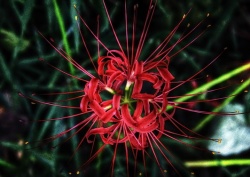Difference between revisions of "Pawos"
Jump to navigation
Jump to search
m (Text replacement - "Vajrayana Buddhism" to "Vajrayana Buddhism") |
|||
| Line 1: | Line 1: | ||
[[File:121006 Manjusaka.jpg|thumb|250px|]] | [[File:121006 Manjusaka.jpg|thumb|250px|]] | ||
| − | < | + | ::{{Nolinking|dpa' bo redirects here and it can also refer to '''[[Arya Shura]]''' (Skt. ''[[Ārya Śūra]]''; Tib. {{BigTibetan|[[དཔའ་བོ་]]}}, [[Wyl.]] ''[[dpa' bo]]'')}} |
| + | -----------<br/><br/> | ||
| + | |||
[[Pawo]] | [[Pawo]] | ||
| + | |||
In [[Vajrayana Buddhism]], [[Pawo]] (Wylie: [[dpa' bo]]; literally "[[brave guy]]") is translated "[[hero]]" or "[[warrior]]". Depending on context, it can refer to the ideal of a [[Vajrayana]] practitioner; to living people (where it is sometimes used as an honorific or part of a name); to legendary or [[mythical]] figures from the past; or to purely [[spiritual]] [[beings]]. | In [[Vajrayana Buddhism]], [[Pawo]] (Wylie: [[dpa' bo]]; literally "[[brave guy]]") is translated "[[hero]]" or "[[warrior]]". Depending on context, it can refer to the ideal of a [[Vajrayana]] practitioner; to living people (where it is sometimes used as an honorific or part of a name); to legendary or [[mythical]] figures from the past; or to purely [[spiritual]] [[beings]]. | ||
| Line 11: | Line 14: | ||
The concept plays a central role in [[Chögyam Trungpa]]'s [[Shambhala]] [[terma]], where "[[pawo]]" is translated "[[warrior]]". | The concept plays a central role in [[Chögyam Trungpa]]'s [[Shambhala]] [[terma]], where "[[pawo]]" is translated "[[warrior]]". | ||
| − | + | ||
{{W}} | {{W}} | ||
[[Category:Dakini's]] | [[Category:Dakini's]] | ||
Revision as of 11:34, 22 July 2014
- dpa' bo redirects here and it can also refer to Arya Shura (Skt. Ārya Śūra; Tib. དཔའ་བོ་, Wyl. dpa' bo)
In Vajrayana Buddhism, Pawo (Wylie: dpa' bo; literally "brave guy") is translated "hero" or "warrior". Depending on context, it can refer to the ideal of a Vajrayana practitioner; to living people (where it is sometimes used as an honorific or part of a name); to legendary or mythical figures from the past; or to purely spiritual beings.
"Pawo" translates the Sanskrit terms daka and vira, with similar meaning.
Pawos are typically described in consort with khandros, their feminine counterparts.
The tülku Nenang Pawo is often known simply as Pawo Rinpoche.
The concept plays a central role in Chögyam Trungpa's Shambhala terma, where "pawo" is translated "warrior".
